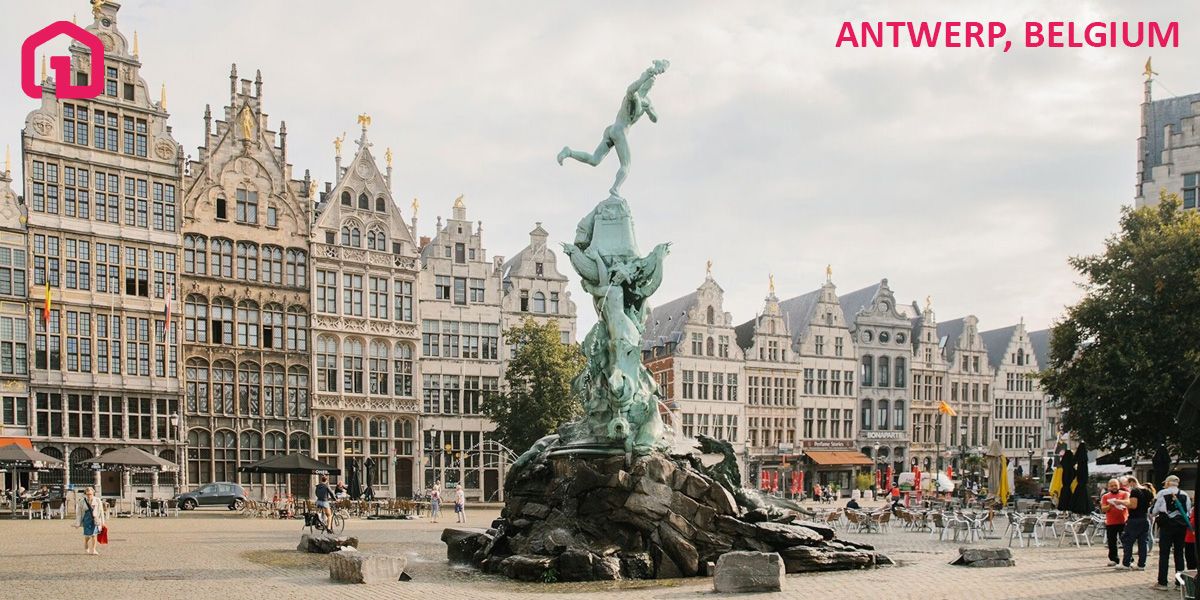CHAT
WITH US
WITH US
GET A
QUOTE
have questions? call us
+44 3330 907053
Home
/
Guides
/
Moving Guides
/
Moving to Belgium from the UK: Complete Guide (2024)
Moving to Belgium fr...

Moving Guides • Europe • 28 Nov 2024
Share this article
Moving to Belgium from the UK offers an exciting opportunity to experience life in the heart of Europe. With its rich cultural heritage, excellent quality of life, and strategic location, Belgium attracts many British expatriates seeking new opportunities post-Brexit. At Deliver1, we’ve moved countless people to their new lives in Belgium, let us walk you through the process step-by-step, ensuring you don't miss any important details.
Since Brexit, British citizens need to follow third-country national procedures when moving to Belgium. The process requires careful planning and specific documentation. Your first step is determining your residency category based on your situation:
Following Brexit, UK citizens need to navigate new visa requirements when moving to Belgium. Whether you're planning a short business trip or a permanent relocation, understanding these requirements is crucial for a legal stay in the country.
UK citizens can enter Belgium for short stays without a visa, thanks to the Schengen area visa-waiver agreement. However, there are important restrictions:
Visit the Belgian Embassy's Visa Information page for the latest requirements and updates.
For stays longer than 90 days, UK citizens must obtain a Type D visa before arriving in Belgium. The specific type depends on your purpose of stay:
Most common for British citizens and requires:
Processing time: 2-3 weeks after work permit approval
For those planning to work as freelancers or start a business:
Required for courses longer than 90 days:
For joining family members already resident in Belgium:

Since 2019, Belgium operates a single permit system combining work and residence authorization:
Self-employed individuals must obtain a professional card unless exempt:
Within eight days of arrival, you must:
Remember that visa requirements can change. Always check the latest information through official channels before making travel plans or applying for any visa type.
For the most current requirements and application procedures, contact the Belgian Embassy in London or consult with an immigration lawyer specializing in Belgian migration law.
If you're moving for work, you'll need either an employment contract or a solid plan for self-employment. Belgium's job market differs significantly from the UK's:
Key resources for job hunting:
Gather and authenticate these essential documents:
Get documents apostilled through the UK Legalisation Office. For Belgian requirements, check the Belgian Embassy in London.
Belgium's healthcare system operates differently from the NHS. You'll need to:
Visit the Belgian Social Security website to understand:
Open a Belgian bank account as soon as possible. Major banks include:
You'll need:
Understand your tax obligations:
Consult the Belgian Federal Public Service Finance for detailed tax information.
Belgian housing differs from the UK market. Start your search early through:
Consider:
Typical documentation needed:
If moving with children, research:
Popular options include:
Consider:
Belgium has three official languages: Dutch, French, and German. While English is widely spoken in Brussels, learning the local language is crucial. Start with:
Focus on:
Decide whether to:
For vehicle import:
Public transport options:

Moving your possessions to Belgium requires careful planning and consideration. Most British expatriates use a combination of air freight for essentials and sea freight for larger items. When selecting a shipping company, look for those with specific experience in UK-Belgium moves, as they'll understand the customs requirements and documentation needed for both countries.
Typical shipping times vary significantly: Air freight typically takes 3-5 days Sea freight usually takes 1-2 weeks to Belgian ports Road freight (increasingly popular for EU moves) takes 2-4 days
You'll need a detailed inventory of all items being shipped, and certain items require special documentation or may be prohibited entirely. The Belgian Customs and Excise website provides comprehensive information about restricted and prohibited items.
Before leaving the UK, ensure you've properly closed or transferred all essential services:
Contact HMRC to file a P85 form to notify them of your departure. This helps establish your tax status and may enable you to claim a tax refund. You'll also need to notify the Department for Work and Pensions if you receive any benefits or have a state pension.
Arrange for the UK Electoral Register to remove your name, but consider registering for overseas voting if you wish to maintain voting rights in UK elections. The Electoral Commission provides guidance on maintaining your democratic participation rights.
Within eight days of arriving in Belgium, you must register at your local municipality (gemeente/commune). This is perhaps the most crucial administrative step in your move. Book an appointment at your local town hall (gemeentehuis/maison communale) as soon as possible after arrival.
You'll need to bring:
The registration process typically involves:
Belgian utilities often work differently from UK systems. Most rental properties require you to set up accounts with:
Energy Providers The Belgian energy market is liberalized, allowing you to choose your provider. Compare options through CREG, the federal energy regulator. Popular providers include Engie, Luminus, and Lampiris. When setting up accounts, you'll need:
Water Services Water is managed regionally:
Internet and Mobile Services Major providers include:
Most providers offer package deals combining internet, TV, and mobile services. Compare packages on Belgium.be.
After receiving your residence card, complete your healthcare registration:
Popular health insurance funds include:
The initial excitement of moving to Belgium eventually gives way to the realities of establishing a long-term life in your new country. This period, typically between two to six months after arrival, is crucial for laying down roots and creating a sustainable lifestyle that will serve you well in the years to come.
Belgium's multi-cultural society offers numerous pathways to social integration, but many expatriates find this aspect of relocation particularly challenging. The country's linguistic divisions and strong local communities can initially seem impenetrable to newcomers. However, with the right approach and persistence, you can build a rewarding social life that bridges both expatriate and local communities.
The expatriate community in Belgium, particularly in Brussels, is well-established and welcoming. While it's important not to limit yourself to expatriate circles, these organizations provide an invaluable support network during your early months and can often lead to lasting friendships and professional connections.
The Brussels Expat Club offers more than just social events; it provides practical support through workshops, information sessions, and networking opportunities. Their regular "New in Brussels" orientations are particularly helpful for recent arrivals, covering everything from cultural adaptation to practical tips about daily life.
The British Chamber of Commerce in Belgium, while primarily a business organization, runs excellent social and professional networking events. Their mentoring program pairs newcomers with established members of the community, providing invaluable insights and connections.
Local sports clubs and cultural associations deserve special attention. Belgium has a strong tradition of community sports clubs, from football to pétanque, and joining one can provide regular social contact with locals while improving your language skills. The Sport Vlaanderen website in Flanders and Adeps in Wallonia list local clubs and activities.
While many Belgians speak excellent English, particularly in Brussels, investing in language learning is crucial for long-term integration. The linguistic complexity of Belgium – with Dutch, French, and German as official languages – can seem daunting, but focused effort in learning the dominant language of your region will pay dividends in both professional and social contexts.
Adult education centers (Centra voor Volwassenenonderwijs or CVO) in Flanders offer structured language courses at very reasonable prices. These courses often follow the European Framework for Languages and provide officially recognized certificates upon completion. Classes typically run in the evenings to accommodate working professionals.
The House of Dutch in Brussels specializes in teaching Dutch to newcomers. Their courses are tailored to different proficiency levels and life situations, from basic survival Dutch to professional language skills. They also organize language exchange events and cultural activities.
For French language learning, the Alliance Française offers high-quality courses with flexible scheduling options. Their cultural program includes film screenings, lectures, and social events, providing opportunities to practice your French in real-world situations.
Consider complementing formal language courses with:
The Belgian workplace can be quite different from what British expatriates are used to, and understanding these differences is key to professional success. Belgian business culture combines elements of both Northern and Southern European approaches, resulting in a unique professional environment.
The formal business environment in Belgium reflects a hierarchical society where titles and positions are taken seriously. Using the appropriate form of address and maintaining professional boundaries is important. Unlike the more casual UK workplace, Belgian offices often maintain stricter formality in dress code and communication styles.
Work-life balance is not just a buzzword in Belgium but a fundamental aspect of the culture. The legal working week is 38 hours, and overtime is strictly regulated. Lunch breaks are typically longer than in the UK, often lasting an hour, and are seen as an important part of the workday for building relationships with colleagues.
Linguistic sensitivity is crucial in the workplace. In Brussels, many offices operate bilingually (French/Dutch) or trilingually (adding English). Understanding and respecting language protocols is essential for workplace harmony. Even if your role is primarily in English, showing effort to use local languages will be appreciated.
Belgium places high value on qualifications and certificates. Keep copies of all your professional certificates and consider having key documents translated and notarized. Professional organizations often offer additional certifications that can enhance your career prospects.
In Belgium, professional success often depends as much on who you know as what you know. The country's compact size and centralized business districts make networking particularly effective. However, the approach to networking tends to be more formal and structured than in the UK.
LinkedIn Belgium groups serve as an excellent starting point, but their real value comes from active participation rather than passive membership. Join groups relevant to your industry and location, such as "Professional Brussels" or industry-specific networks. Remember to update your profile to reflect your new location and any additional language skills you're developing.
Industry-specific associations in Belgium often hold significant influence and can provide valuable connections and insights. These organizations frequently offer:
The Federation of Belgian Chambers of Commerce organizes regular events across the country. These range from informal breakfast meetings to formal business seminars. While membership fees can be substantial, the networking opportunities and business insights often justify the investment.
Managing your finances in Belgium requires understanding a different financial landscape from the UK. The Belgian system emphasizes stability and long-term planning, with specific structures for savings, investments, and pensions that may differ significantly from what you're familiar with.
Belgian banks offer various savings products, each with different tax implications. The most common is the regulated savings account (compte d'épargne réglementé/gereglementeerde spaarrekening), which benefits from favorable tax treatment. Interest earned up to a certain threshold is tax-exempt, making these accounts popular among Belgians.
Investment options include:
Each has different tax implications and risk profiles, so consulting with a financial advisor familiar with both UK and Belgian systems is recommended.
Understanding and planning for retirement in Belgium is crucial. The system operates on three pillars:
Belgian taxation can be complex, with high rates but numerous deductions and benefits. Key considerations include:
Consider engaging a tax advisor familiar with both systems, especially during your first years of residence.

Moving with children requires careful attention to their educational and social adaptation. Belgian schools offer high-quality education but operate differently from the British system.
When monitoring your child's adaptation to Belgian education, consider:
Academic Support
The Belgian education system emphasizes:
Language Support Most schools offer additional language support through:
Work with the school to develop a language acquisition plan that suits your child's needs. Many schools have experience with international students and can provide targeted support.
Belgian schools typically finish earlier than UK schools, making after-school activities an important consideration. Look into:
These activities play a crucial role in social integration and language acquisition. The ONE (French-speaking) and Kind en Gezin (Dutch-speaking) organizations provide information about youth activities and support services.
Supporting your family's cultural integration involves:
Many municipalities offer integration services, including:
Maintaining legal compliance in Belgium requires attention to various deadlines and obligations. The Belgian system is highly bureaucratic, and missing key dates or requirements can lead to complications with your residency status or other official matters.
Your initial residence permit (usually valid for 1-5 years) will need renewal before expiry. The renewal process typically begins three months before expiration and requires:
The Immigration Office provides detailed renewal requirements, but remember that procedures can vary by municipality. Set calendar reminders several months before key dates to ensure ample preparation time.
The post-Brexit landscape continues to evolve, affecting British citizens' rights in Belgium. Stay informed through:
Keep documentation of your continuous residence in Belgium, as this may affect your rights under the Withdrawal Agreement.
Belgian tax obligations differ significantly from the UK system. Key dates include:
Consider using a tax advisor for at least your first few returns, as mistakes can be costly and time-consuming to rectify.
Belgian vehicle regulations require:
The Belgian Mobility website provides comprehensive information about vehicle regulations and requirements.
True integration into Belgian society goes beyond legal compliance and basic language skills. Understanding and participating in local culture enriches your experience and creates lasting connections.
Belgium's rich cultural calendar offers numerous opportunities for integration:
Each region and even individual communes have their own traditions and celebrations. The Visit Belgium website provides a comprehensive events calendar.
Active participation in local life helps build connections:
Neighborhood Committees Many Belgian neighborhoods have resident committees organizing:
Cultural Centers Every commune has a cultural center offering:
Belgian food culture is an essential part of social life:
Join cooking classes or food tours to better understand this important aspect of Belgian life.
Whether renting or buying, understanding Belgian property law and customs is crucial for long-term residents.
Belgian rental law strongly protects tenants but also imposes specific obligations:
Maintenance Responsibilities
Insurance Requirements Belgian law requires:
If considering buying property, understand:
Purchase Process
Ongoing Obligations
After five years of continuous legal residence in Belgium, British citizens can apply for permanent residency. This process requires careful planning and documentation from your first day in the country.
The path to permanent residence requires demonstrating:
Start gathering evidence early:
The Immigration Office provides detailed guidance on permanent residency applications. Consider consulting with an immigration lawyer several months before applying to ensure your documentation is complete.
Understanding the Belgian pension system is crucial for long-term financial security. The three-pillar system requires active management:
State Pension (First Pillar)
Occupational Pension (Second Pillar)
Private Pension (Third Pillar)
Long-term financial planning in Belgium should consider:
Property Investment
Investment Strategies
Long-term healthcare planning involves understanding:
Basic Coverage
Supplementary Insurance
Passport Management
UK Government Services
UK Banking British banks often restrict services for non-residents. Plan for:
Tax Obligations
Successfully settling in Belgium long-term requires careful planning and regular attention to various aspects of life. While the initial move focuses on immediate needs, long-term success depends on:
Remember that integration is an ongoing process, not a destination. Regular review and adjustment of your long-term plans will help ensure a successful and fulfilling life in Belgium.
Keep all documentation organized and easily accessible, stay informed about changes in regulations affecting British citizens, and maintain strong connections in both countries. This balanced approach will help you build a secure and satisfying life in your new home while maintaining important ties to the UK.
Simplify your logistics and removals with Deliver1. Whether you're relocating your business or moving home, our expert team is here to handle every aspect of the process. From planning and packing to transportation and disposal, we’ve got you covered. Contact us today to discuss your specific needs and receive a tailored solution.
Your visa requirements will depend on your nationality and reason for moving. As a UK citizen, you may need a visa to live and stay in Belgium. It's essential to check the latest visa regulations on the Belgian government website or consult the Belgian embassy or consulate in the UK.
For UK citizens wishing to work in Belgium, you will typically need a type B work permit. This permit allows you to work in a specific job for a particular employer. To apply for a type B work permit, you'll need a job offer from a Belgian employer. For non-EU and EEA citizens, we recommend consulting with the Belgian embassy or consulate.
As a UK citizen moving to Belgium, you will need to register with the national health insurance system. This will provide you with access to healthcare services, similar to the NHS in the UK.
Brexit has changed the rules for UK citizens moving to the EU. You'll need to comply with the new immigration rules and visa requirements. It's crucial to stay updated on the latest regulations and seek advice from the Belgian authorities or a qualified immigration advisor.
The cost of living in Belgium can vary depending on the region. Generally, the cost of living is comparable to the UK, with some variations in housing, transportation, and food costs.
When moving to Belgium, you'll need to consider international removals. It's advisable to hire a reputable international removals company like deliver1 to handle the transportation of your belongings.
Belgium has its own tax system, which may differ from the UK's. It's essential to understand your tax obligations as a resident of Belgium. You may want to consult with a tax advisor to ensure compliance with Belgian tax laws.
We love hearing from you-so please get in touch with any questions or queries.
We love hearing from you-so please get in touch with any questions or queries.
Working hours
Mon - Sat: 08:00 - 17:00
Sun: Closed
Call
+44 3330 907053Location
Unit 3, Newyears Green Lane
Newyears Green
Uxbridge
UB9 6LX
United Kingdom
